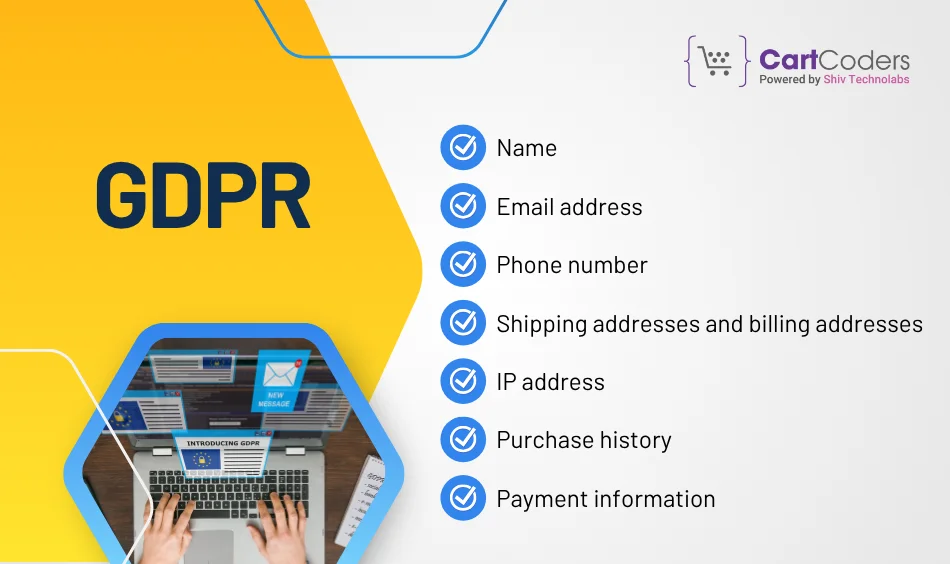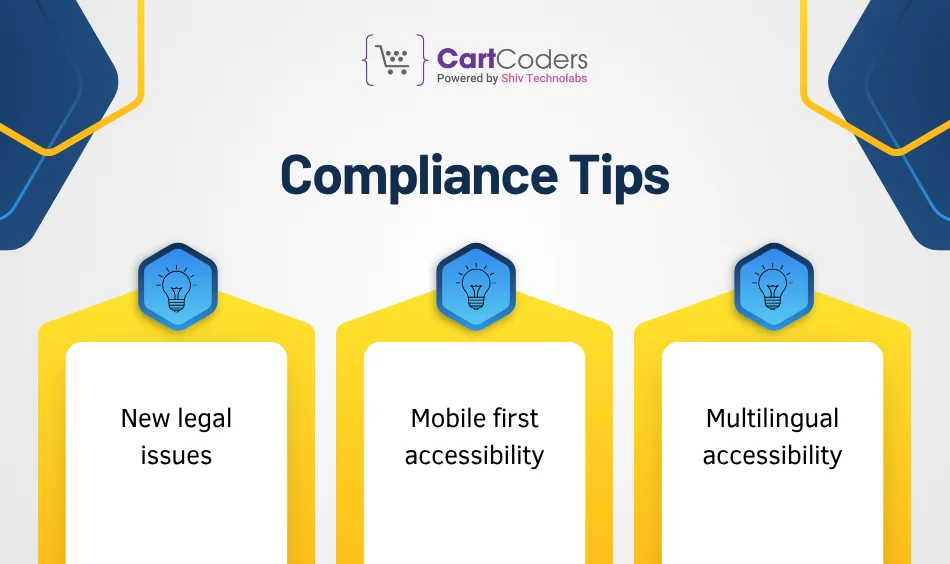Custom Engagement Solutions
Unlock tailored solutions with a free, no-obligation strategy session.
Expert Developers & Engineers on Demand
Scale Your Team with Skilled IT Professionals
Expert Guidance for Digital Transformation

Creating an effective eCommerce shop requires more than uploading products and offering a smooth checkout process. GDPR compliance and ADA compliance are two of the most essential subjects that all online retailers should consider.
The General Data Protection Regulation (GDPR) is a set of standards presented by the European Union, aiming to regulate the ways businesses gather, store, and process personal data belonging to EU residents. In the meantime, the Americans with Disabilities Act (ADA) requires that any business accessible to people with disabilities make their websites accessible.
Beyond legal obligations, compliance offers three significant benefits:
As an owner of an eCommerce business, the following guide will provide you with the basics of eCommerce GDPR compliance and ADA compliance for online stores so that you can prevent breaking the law and be able to offer your services to a broader audience.

The General Data Protection Regulation (GDPR) is a European Union law that governs how companies handle the personal data of EU citizens.
GDPR for online stores applies to any company that gathers data on people using the service in the EU, regardless of the company’s location. In the case of eCommerce, that usually constitutes:
Also Read:- Top 10 Shopify Accessibility Apps – ADA & WCAG Compliance
The consequences of non-compliance are quite severe: a fine of up to 20 million euros or 4 percent of annual global turnover, or higher. In addition to the penalties, a lack of adherence may hurt your reputation and customer trust.
In a bid to make your store GDPR compliant, pay attention to the following:
The following is a practical GDPR checklist for eCommerce websites:
The above points are required in cases where you apply GDPR to your online shops, as well as when selling abroad.
Here are the key differences to help you make your store accessible:
The ADA is a civil rights act that does not permit discrimination against a person with disabilities. Although this was initially aimed at physical spaces, it has since been broadened to include websites and digital services, including those focused on conducting business, such as e-commerce.
eCommerce ADA compliant refers to the ability to ensure that even those with visual, auditory, motor, and cognitive disabilities can navigate your site.
In addition to the legal requirements, it is about inclusive design: enhancing the experiences for all users and catering to a broader customer base.
The gold standard of web accessibility is the Web Content Accessibility Guidelines (WCAG) 2.1 AA. In the case of eCommerce, this translates to:
Besides making your store user-friendly when it comes to WCAG 2.1 AA self-compliance among eCommerce stores, it will also reduce the risk of an ADA lawsuit.
An ADA compliance checklist e-commerce stores was taken up as an ADA compliance that you can use right now by e-commerce store owners:
eCommerce ADA compliance ensures that your shop is accessible and compliant.
Active monitoring and production of your site will assure that your store satisfies the eCommerce entry requirements. Some necessary tools are the following:
Tips for Inclusive Design:
Accessibility is not a temporary solution; it is a continuous process of building up on it.
A store created in Shopify will have a large number of third-party applications:
Such applications enable you to implement a GDPR checklist for e-commerce and accessibility requirements without having to reinvent the wheel.
Why Hire Shopify App Integration Experts?
The Shopify app Integration services are beneficial for:
Professional assistance will not only make sure you simply set up tools but also that you succeed in practicing them with all the advantages of legalization and usability.
If you want a fast way to improve ADA and WCAG compliance, the Accessibility Assistant app is a smart choice. This Shopify app helps store owners identify and fix accessibility gaps—without touching code.
Here’s what it does:
Whether you’re just starting or already running a growing store, this app simplifies compliance while improving usability for everyone. Install it directly from the Shopify App Store →

The laws and expectations keep changing. From the year 2025 on, store owners in eCommerce must be concerned with the following:
Avoid trying to be reactive, but stay proactive, as the concept of compliance will take even more seriousness.
At CartCoders, we specialize in building secure, accessible, and fully compliant Shopify stores. Whether you’re dealing with GDPR data handling or ADA accessibility, we provide custom app integrations, support for privacy policies, and ongoing compliance consulting. Explore our complete Shopify integration services at Shopify Third-party API Integration Solutions.
Compliance with GDPR and ADA is no longer a nice to have. They are necessary for preventing the need for legal measures and expensive fines, as well as for creating an open and friendly shopping process for all shoppers.
Nothing stops you from optimizing your current store or starting the first Shopify store; the moment is now. Working with experts who know how to operate in Shopify will ensure that you not only meet the regulations but are also well-prepared for the future.
Are you ready to power up your Shopify shop? Explore our CartCoders Shopify Integration Services, and we’ll create a store that is legally compliant, accessible to all users, and poised for growth.
Projects delivered in 15+ industries.
95% retention rate, building lasting partnerships.
Serving clients across 25+ countries.
60+ pros | 10+ years of experience.